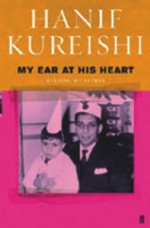|
Book
Review
"A
Cross Between Lovemaking and an Autopsy"
Hanif
Kureishi
My
Ear His Heart
By Hanif Kureishi
 Pride,
tenderness, anger and love ooze from Hanif Kureishi's memoir
of his father like toothpaste from a split tube. It is a book
of great compression and intensity, which refuses the easy
elegiac tone, lenient humour and tear-jerking scenes you might
expect from this now familiar confessional genre - but it
is nevertheless funny and moving. My Ear at His Heart
can be a difficult, prickly, angular piece of work, disclosing
emotions with which the author has clearly yet to come to
terms. There are unresolved issues here, unaccommodated feelings.
Kureishi calls this book "a cross between love-making
and an autopsy". Not just that, either, but a riveting
piece of textual detective work. Pride,
tenderness, anger and love ooze from Hanif Kureishi's memoir
of his father like toothpaste from a split tube. It is a book
of great compression and intensity, which refuses the easy
elegiac tone, lenient humour and tear-jerking scenes you might
expect from this now familiar confessional genre - but it
is nevertheless funny and moving. My Ear at His Heart
can be a difficult, prickly, angular piece of work, disclosing
emotions with which the author has clearly yet to come to
terms. There are unresolved issues here, unaccommodated feelings.
Kureishi calls this book "a cross between love-making
and an autopsy". Not just that, either, but a riveting
piece of textual detective work.
Shannoo
Kureishi was one of many brothers, "Chekhovian in their
drift and futility", who came from India after partition
to the London suburbs, married an Englishwoman and became
a minor civil servant in the Pakistani embassy. He liked to
be well dressed, was in fact almost a dandy, with a kind of
"Muslim gaudiness", and loved the infant Hanif to
massage his back and rub oils into his hair. He adored cricket,
and named his son after the Pakistani player Hanif Mohammed:
"Father and I fixed a cricket ball to a piece of string
and tied it to the branch of an apple tree. I would hit the
ball with a broom handle. Dad told me the Australian genius
Bradman had done this, to improve his accuracy."
But
Shannoo's obsessive coaching and vituperative scorn triggered
volcanic rages: "I'd have hysterical crying fits, little
breakdowns, tantrums. Tennis racquets and cricket bats would
get smashed." Kureishi doesn't mention it, but one wonders
if the tempestuous scene in his movie The Mother,
in which Daniel Craig's despairing carpenter smashes up his
work, is taken from life.
But
more than anything, Shannoo loved books and, heartbreakingly,
wrote a string of unpublished novels and unproduced plays.
He showed Hanif how a dedicated writer worked, and passionately,
obsessively, followed his literary dream, even as his son's
career was taking off. Shannoo had been jealous of his more
successful brother Omar and was now jealous, too, of his own
son, feelings complicated by pride and humble hope that Hanif's
glittering contacts could at last get him into print: "But
you are knowing all these damn people, yaar?"
It was not to be. Were Shannoo's novels so awful? Could Hanif
have given advice, pulled some strings, and turned Shannoo
into a kind of Shiva Naipaul to his Vidia? Or did this provoke
an Oedipal crisis in Hanif, an ambivalence about helping the
man who had been so cruel and cutting about his poor cricket
skills and indeed his early, faltering literary efforts?
It
is difficult to tell. This memoir revolves around Kureishi's
discovery, years after his father's death, of Shannoo's novel
An Indian Adolescence in an incomplete manuscript.
By comparing it to Omar's own works of autobiography, Kureishi
establishes to his satisfaction that this is an electrifyingly
real guide to Shannoo's hidden early life, the character of
his overbearing and libidinous father Col Kureishi and a mother
who retreated into pious Islam - and also to Shannoo's love
for and envy of his overachieving brother Omar. Another unpublished
novel, The Redundant Man, gives an authentic account
of Shannoo's melancholy and disappointment with life and his
irritation with his trendy son.
These
books are not quoted at any length, so it's frustratingly
hard to get any sense of Kureishi Sr's literary personality,
and even now I wonder if Hanif might not later bring out some
kind of labour-of-love edition of these works with his own
introduction. But the real drama is Hanif's reading of the
texts, now, as a man in early middle age, and his painful
response to the father who shaped his son in a career he so
dearly wanted for himself. Later, Hanif is to find another
version of An Indian Adolescence, in handwriting
scrawled on the back of old birthday cards and religious pamphlets.
This is even more revealing, and shows that Shannoo's earlier,
derisive fictional depiction of Hanif, the absurdly posturing
young rebel from The Redundant Man, now stunningly
resembles an Indian faith healer who saves Shannoo's life.
The whole thing is a compelling literary performance, like
a desperately sad and comic inversion of U and I, Nicholson
Baker's fan letter to Updike.
Kureishi,
the accomplished author of novels, plays, screenplays and
TV scripts, unblushingly quotes a complimentary letter he
has received from Philip Roth: "If you don't mind me
saying so, I have a feeling you can give us your world more
powerfully in fiction than in films." It may be so. At
any rate, he probably has not done anything as good, in any
medium, as this moving and fiercely honest book.
Source:
The Guardian
Copyright
(R) thedailystar.net 2004
|
